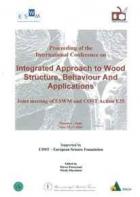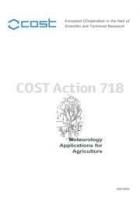
Proceedings of ELCAS 2011 - 2nd International Exergy, Life Cycle Assessment and Sustainability Workshop & Symposium – Final Conference of COST Action C24

Low floor buses - Draft Final Report of the Action

Preparation of the Final Report

Integrated Approach to Wood Structure, Behaviour and Applications

Development of a New Headform - the Bimass Dummy Head

COST Exploratory Workshop "Integration and Synergy on Environment and Health"
- Pages: 117
- Publisher(s): COST Office
- Download from external website
Abstracts of the COST Exploratory Workshop “Integration and Synergy on Environment and Health”, which took place in Brussels, Belgium on 16-18 February 2005.

Environmentally Friendly and Safe Technologies for Quality of Fruits and Vegetables
- Author(s): Carla Nunes (Ed)
- Publisher(s): Universidade Do Algarve 2010
- ISBN/ISSN: 978-989-8472-01-4
Proceedings of the International Conference “Environmentally friendly and safe technologies for quality of fruit and vegetable”, held in Universidade do Algarve, Faro, Portugal, on January 14-16, 2009. This Conference was a join activity with COST Action 924.

Meteorology Applications for Agriculture
- Pages: 198
- Author(s): G. Maracci, A. Mestre, L. Toulios, L. Kafjez-Bogataj, A.A. Hochevar
- Publisher(s): EU Publications Office (OPOCE)
- http://bookshop.europa.eu/uri?target=EUB:NOTICE:QSNA22255:EN:HTML
- ISBN/ISSN: 978-92-898-0023-5
- EUR: 22255
Agricultural productions are very much influenced by weather conditions. Favorable weather significantly boosts productions while unfavorable weather may cause extensive losses. So agriculture needs agro meteorological models to predict and forecast crop yields and productions, to support decision and to minimize environmental costs of agriculture with short-term consequences (quality of products, fertilization:N, Pesticide) and outputs or inputs with long-term consequences (reduction of water resources, modifications of climate).

